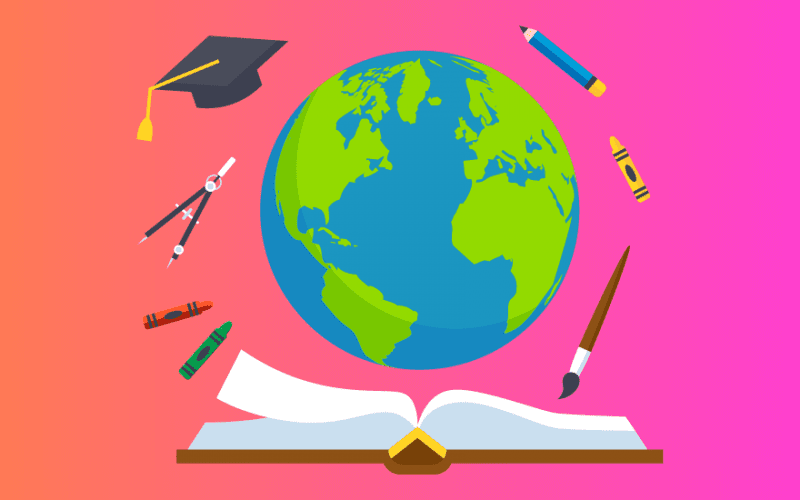What is education? Education is the process of forming and shaping a person from the time of infancy until old age. It encompasses everything that influences the human personality, from infancy to maturity. Education is an institution or regulation that improves every aspect of society and modifies human behavior. Its main aims are social, cultural, and individual goals. In today’s society, technology has become an increasing influence on education.
Individual aims and social aims are the most important aims of education
Education has two main focuses: individual aiming and social aiming. Individual aims refer to preparing individuals to live full lives, which means they should exercise all their capacities for well-being, be gainfully employed, have good health, and develop their personalities harmoniously. Social aims refer to enabling individuals to contribute to society. They are related to ideals of life, such as social justice, equality, and secularism.
The social aimed of education is based on the assumption that society is better than an individual. Therefore, education should aim to fulfill the needs of society, as well as the welfare of the state. This is important in strengthening the social qualities of man, and will help bring about peace in society. This aims of education must be clearly stated. They should be formulated in a way that will enable students to achieve their personal goals and fulfill their social obligations.
Technology has become an increasingly influential factor in education
In many cases, technology can enhance education by promoting collaborative learning. It can also personalize education by reducing the need to deliver vast amounts of information over networks and tailoring educational programs to the needs of individual learners. Technology can also be a significant factor in the creation of good-to-great systems. Ultimately, education should remain the most important component of society. But technology cannot replace the role of educators.
The role of technology in education is vast, as it equips teachers with various tools to enhance learning. It facilitates collaboration between educators and students and opens up new ways of learning and working. Thanks to the global reach of the Internet, education can happen anytime, anywhere. Educators must take advantage of this fact to create the best educational experiences possible for students. This is the primary challenge for instructional designers and educational technology companies.
Transmission of cultural heritage
The transmission of intangible cultural heritage has both economic and social benefits. In Armenia, for instance, it is considered a driver of socio-economic growth. The School-Workshop Programme: Tools for Peace includes the social purpose of battling poverty and inequality. It also aims to teach young people skills related to intangible cultural heritage, such as herbal medicine and environmentally sustainable permaculture. Besides, it promotes respect for intangible cultural heritage by promoting the knowledge and skills of indigenous peoples.
This type of education also aims to build students’ awareness of place definitions. Students learn to appreciate shared values, perspectives, and practices. Through the process of learning about cultural heritage, students will be able to explore their own culture and engage with their peers. As they gain awareness of their own culture, they may be inspired to explore their birth culture. Likewise, students who have had to adapt to another culture can benefit from a learning environment that focuses on their roots.
Preparation for life
Is education preparation for life? Or is it a means of survival? John Dewey said that education is life itself. Since then, human beings have been trying to make education a freedom for them. Today, education is one of the most powerful tools for achieving this goal. With education, we learn how to relate with other people, understand their perspectives and build new understandings. But is education preparation for life a worthwhile pursuit?
John Dewey believed that education is life itself, and that education should connect with our everyday lives. Education is a lifelong process that includes experience, environment, socialisation, communication, and learning. In short, education is a process that is never complete, but it should be continuous. In the case of a student, a college degree isn’t enough. It will be more valuable if they can integrate their education with their everyday life.
Engagement in society
The engagement of citizens and the corresponding benefits for society are both common societal concerns. Among these are better health, increased labor productivity, enhanced competitiveness, and greater democratic participation. However, to sustain the engagement of citizens, schools and communities must establish a solid foundation based on shared accountability, information, and knowledge. It is only through this collective commitment that the educational institutions can sustain their commitments to social inclusion and development.
The definition of engagement in communities varies depending on the context. The purpose is to better engage the community and to achieve long-term sustainable outcomes. It involves the use of strategies and tools to achieve the desired goals. It also requires the use of community-based approaches that are sensitive to the context in which they are implemented. In many cases, community engagement is a difficult process and requires considerable resources. Nonetheless, the rewards of effective engagement in society are well worth the effort.


